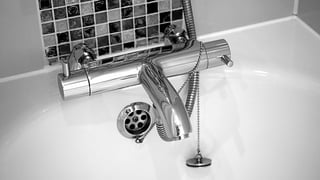 Spring is on its way, and we want to make sure your home is ready to look (and feel) its best when the flowers start to bloom!
Spring is on its way, and we want to make sure your home is ready to look (and feel) its best when the flowers start to bloom!
With Ken's Plumbing, we are here for you 24/7/364, so just in case things don't quite go your way this spring, make sure you call The Picky People's Plumber for your every need.
Until then, hopefully these spring cleaning tips get you where you need to be.
Interior Plumbing
Kitchen/Bathrooms
- Check faucets for drips or leaks.
- Ensure that all shower drains have strainers to prevent hair, soap, and debris from clogging the drain lines.
- Check your toilets for hidden leaks and inspect the tank and bowl for cracks or leaks.
- Make sure your toilets flush properly. If the handle must be held down for a thorough flush or jiggled to stop the water from running, you may need to replace the worn tank parts. This could lower your water bills extensively.
Appliances
- Check the temperature setting on the water heater. It should be set no higher than 120°F to prevent scalding and reduce energy use.
- Have an old water heater? Consider replacing yours if it's more than 15 years old.
- Make sure any flammable objects are not stored near the water heater or furnace.
- Check dishwasher, washing machine and ice maker supply hoses for bulges or leaks.
- Replace hoses showing signs of aging or damage, then replce the hoses with stainless steel hoses wherever possible, as they are more reliable and less prone to bursting than other types.
General
- Pour a gallon of water into infrequently used drains (including floor drains) to fill the trap and prevent odors from entering the house. Slow floor drains should be snaked to ensure they will carry away water quickly in the event of a flood.
- Check exposed pipes under sinks and in the basement for signs of leaks.
- Inspect for slow leaks in your home by looking at your water meter before bedtime. The next morning, without using any water overnight, take another look at the meter. If the reading has changed, you have a leak that should be repaired.
- Install flood alarms. Like a smoke alarm, a flood alarm is a battery-operated device that sounds an alarm when it comes in contact with water. This can help prevent potential flooding or leaks in the future.
Exterior Plumbing
- Make sure yard drains, gutters and downspouts are cleaned out, open, and free of debris that found its way in there over the fall and winter seasons.
- Check for bird nests in vent pipes.
- Check exterior faucets and hose bibs to make sure water flows freely.
- If you noticed an outdoor faucet drips the first time the hose is turned on, you may have had a frozen pipe that cracked and needs to be replaced.
Have any more questions? You can reach us by phone anytime at (864) 242-5511, or click the banner below to schedule a service online. You can also fill out our contact form to ask our professionals even more about what to do to prepare for spring.


.png)